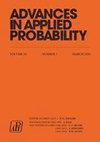大都市以外MCMC的最优缩放
IF 1.2
4区 数学
Q3 STATISTICS & PROBABILITY
引用次数: 7
摘要
摘要马尔可夫链蒙特卡罗算法中建议分布的最优缩放问题对生成样本的质量至关重要。对于各种Metropolis-Hastings (MH)算法,已经进行了大量的工作来获得这样的结果。最近,除了MH之外,可接受概率也被用于难以处理的目标分布问题。针对这种情况调优高斯提议分布的可用资源很少。我们得到了一类可接受函数的最优缩放结果,其中包括Barker算法和lazy MH算法,特别是Barker算法的最优值与MH算法的最优值明显不同。我们的理论结论得到了数值模拟的支持,表明当最优提案方差未知时,调整到最优接受概率仍然是一种有效的策略。本文章由计算机程序翻译,如有差异,请以英文原文为准。
Optimal scaling of MCMC beyond Metropolis
Abstract The problem of optimally scaling the proposal distribution in a Markov chain Monte Carlo algorithm is critical to the quality of the generated samples. Much work has gone into obtaining such results for various Metropolis–Hastings (MH) algorithms. Recently, acceptance probabilities other than MH are being employed in problems with intractable target distributions. There are few resources available on tuning the Gaussian proposal distributions for this situation. We obtain optimal scaling results for a general class of acceptance functions, which includes Barker’s and lazy MH. In particular, optimal values for Barker’s algorithm are derived and found to be significantly different from that obtained for the MH algorithm. Our theoretical conclusions are supported by numerical simulations indicating that when the optimal proposal variance is unknown, tuning to the optimal acceptance probability remains an effective strategy.
求助全文
通过发布文献求助,成功后即可免费获取论文全文。
去求助
来源期刊

Advances in Applied Probability
数学-统计学与概率论
CiteScore
2.00
自引率
0.00%
发文量
64
审稿时长
6-12 weeks
期刊介绍:
The Advances in Applied Probability has been published by the Applied Probability Trust for over four decades, and is a companion publication to the Journal of Applied Probability. It contains mathematical and scientific papers of interest to applied probabilists, with emphasis on applications in a broad spectrum of disciplines, including the biosciences, operations research, telecommunications, computer science, engineering, epidemiology, financial mathematics, the physical and social sciences, and any field where stochastic modeling is used.
A submission to Applied Probability represents a submission that may, at the Editor-in-Chief’s discretion, appear in either the Journal of Applied Probability or the Advances in Applied Probability. Typically, shorter papers appear in the Journal, with longer contributions appearing in the Advances.
 求助内容:
求助内容: 应助结果提醒方式:
应助结果提醒方式:


